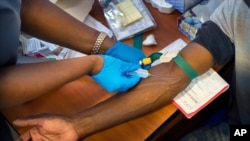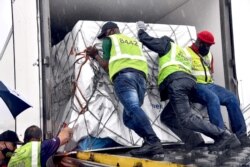Worrying news from South Africa, where health experts say the just-arrived shipment of AstraZeneca vaccines may not work as well against the highly contagious coronavirus variant that is prevalent in the country. That realization means that officials intend to put the mass vaccination program -- the largest in Africa, so far -- on hold before it was to begin.
Clinical studies in South Africa appear to have found no evidence that this vaccine has full efficacy against the variant, known as 501Y.V2 or B1.351.
Dr. Shabir Madhi, the top virologist who headed South Africa’s original vaccine trials and subsequent studies, explained Sunday night in a webcast:
“Currently in South Africa, more than 90 percent of all new infections that are occurring are a consequence of the B1.351 variant, which we know now to be more transmissible and probably also more virulent than the original virus that was circulating,” he said. “So after having done the final analysis, we realized that unfortunately we were experiencing a problem when it came to the effectiveness of this vaccine.”
The AstraZeneca vaccine still appears to work against severe forms of COVID-19, he said. However, against mild or moderate illness, it falls flat.
But, as the charming South African idiom goes, this is not a train smash. The nation’s top scientists agree it’s just another hurdle to overcome in the COVID-19 pandemic.
Last week, officials took delivery of 1 million doses of the vaccine. The plan was to inoculate the nation’s health workers first, before eventually vaccinating 40 million South Africans.
So now what? Much like the science behind all of this, it’s complicated. Health minister Dr. Zweli Mkhize described the setback as a temporary one, and said the government still plans to inoculate health workers, as originally planned, starting this month.
But Barry Schoub, chair of South Africa’s Ministerial Advisory Committee on Vaccines, has recommended a temporary pause. He noted that scientists are hopeful that a one-dose vaccine, still in development by Johnson and Johnson, might yield better results.
But, said the nation’s coronavirus task force chief, Dr. Salim Abdool Karim, there is a middle road. And it’s one that every schoolchild knows about: the booster shot.
“So you would take the existing vaccine to give you immunity against the pre-existing variant, and you take this booster, which would boost it in order to give you protection against the 501Y.V2 variant,” he said. “And we're also going to see a next generation of vaccines, vaccines that are intended to actually be much broader. So they will cover you not only against all the current variants, but also what are likely to be future events and that you're going to see emerging over time.”
And so, Madhi explained, there is room at the table for those one million vaccines in protecting against severe illness.
Meanwhile, the government is looking at other options, as pharmaceutical companies conduct breakneck research to try to find one shot to heal them all. Mkhize said South Africa is leaving no stone unturned and in talks with other manufacturers, including those behind the Russian-developed Sputnik vaccine.





